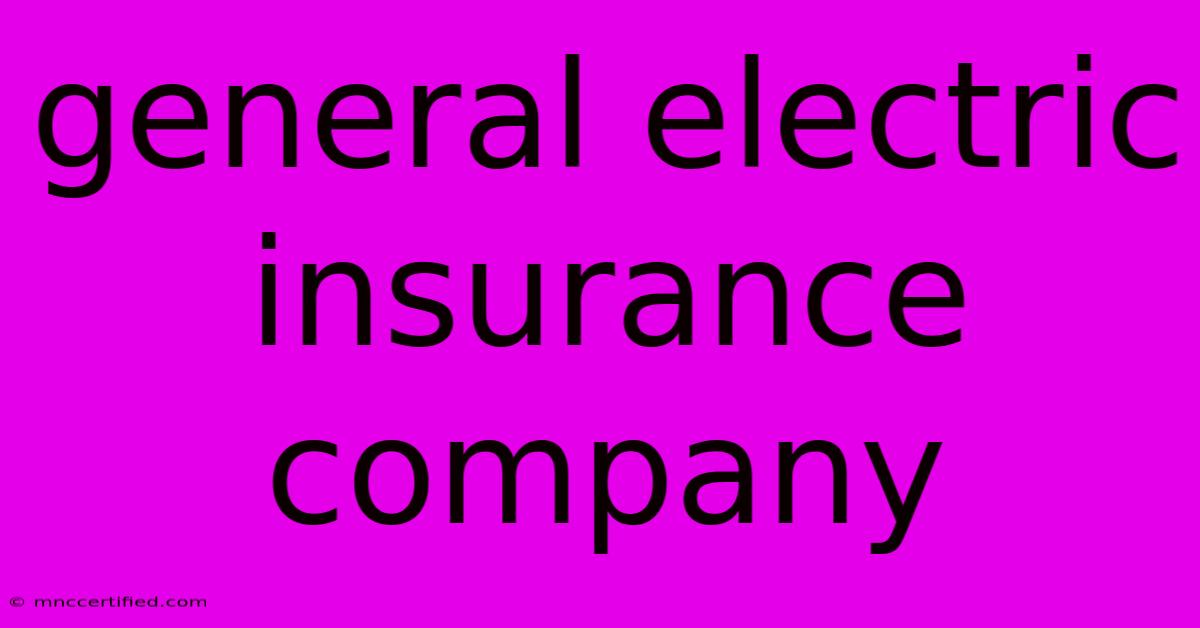General Electric Insurance Company

Table of Contents
General Electric Insurance Company: A Comprehensive Overview
General Electric (GE) isn't solely known for its industrial prowess; it also has a significant history in the insurance sector, although its involvement has evolved over time. While GE no longer operates a standalone insurance company under the name "General Electric Insurance Company" in the traditional sense, understanding its past and current insurance-related activities is crucial. This article explores GE's journey in the insurance world, clarifying its past presence and its current indirect involvement in the industry.
GE's Historical Involvement in Insurance
GE's foray into insurance began decades ago, primarily through its GE Capital subsidiary. GE Capital offered a diverse range of financial services, and insurance played a significant role. They provided various insurance products, including:
- Commercial Insurance: Catering to businesses with diverse needs, this likely encompassed property, casualty, and potentially specialized lines.
- Mortgage Insurance: Protecting lenders against defaults on home loans, a vital part of the mortgage finance market.
- Other Financial Services Insurance: This likely encompassed various insurance products related to other financial services offered by GE Capital.
These activities placed GE as a significant player in the insurance landscape for a considerable period. However, following the 2008 financial crisis, GE underwent a significant restructuring.
The Restructuring and GE's Current Insurance Landscape
GE's post-2008 restructuring led to the divestment of many of its financial services assets, including a large portion of its insurance operations. This significantly altered GE's presence in the insurance market. The company streamlined its focus back to its core industrial businesses. Therefore, searching for "General Electric Insurance Company" today won't yield results for a single, unified entity.
Understanding GE's Current Indirect Involvement
While GE no longer directly offers insurance products under its own brand, its various industrial businesses still necessitate insurance coverage. This means GE likely engages with numerous insurance providers for:
- Product Liability Insurance: Protecting against claims related to defects in their manufactured goods.
- Property Insurance: Covering their extensive manufacturing facilities and assets.
- Workers' Compensation Insurance: Providing coverage for employees injured on the job.
- Cybersecurity Insurance: Protecting against data breaches and cyberattacks.
Essentially, while GE doesn't sell insurance, it remains a substantial consumer of insurance services to mitigate risks across its diverse operations.
Key Takeaways: GE and Insurance
- No standalone "General Electric Insurance Company" exists today. GE's direct involvement in the insurance market, as previously offered through GE Capital, has significantly changed.
- GE remains a major consumer of insurance products. Its industrial operations require substantial insurance coverage to manage risk.
- The legacy of GE Capital's insurance operations is significant. It highlights GE's past influence in the financial services sector.
Understanding this evolution provides a clearer picture of GE's relationship with the insurance industry. Instead of seeking a "General Electric Insurance Company," individuals interested in GE's insurance activities should focus on its current industrial operations and the associated insurance needs of a large multinational corporation. This clarifies the complexities of GE's involvement and avoids confusion stemming from its past presence in the insurance sector.

Thank you for visiting our website wich cover about General Electric Insurance Company. We hope the information provided has been useful to you. Feel free to contact us if you have any questions or need further assistance. See you next time and dont miss to bookmark.
Featured Posts
-
1 1 Draw Venezuela And Brazil Split Points In Qualifiers
Nov 15, 2024
-
Nyu Launches Cross Institutional Advancement
Nov 15, 2024
-
Mother Daughter Bond Knot Bracelet
Nov 15, 2024
-
Jalen Hurts Rushing Td Fuels Eagles Week 11 Victory
Nov 15, 2024
-
Spend Connect Live Key Innovations
Nov 15, 2024